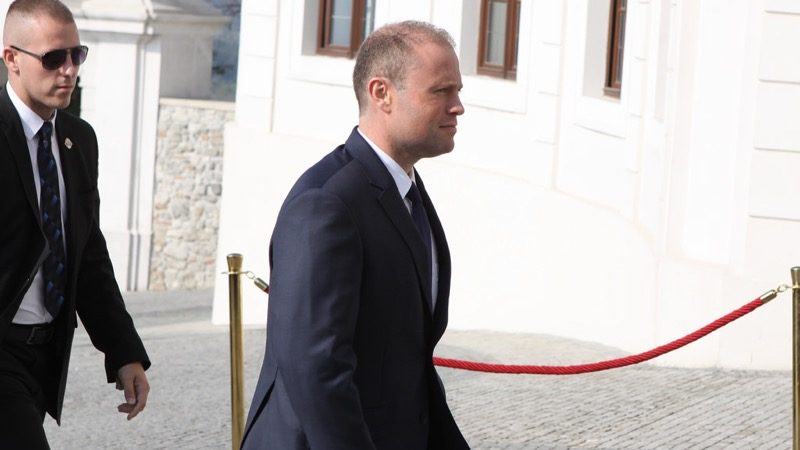Prime Minister and Labour leader Joseph Muscat claimed in an interview on Sunday with Labour’s One Radio that the European Commission has recognised his government’s effort to control money-laundering and corruption, in reference to the EC’s country specific recommendations for Malta published on 23 May.
Labour’s One News drove Muscat’s narrative, citing a reference in the report that ‘the Commission takes note of Malta’s commitment to fight against taxpayers aggressive tax planning’, but made no mention of the EC’s statements on corruption and watered down its statements on governance.
The usually diplomatically worded EC report said of Malta:
- ‘The justice system continues to face challenges with regards to its efficiency and a strengthened legal and institutional framework to fight corruption is necessary to ensure a high quality business environment’.
- ‘Governance shortcomings in the anticorruption framework may adversely affect the business climate and weigh negatively on investment.’
- ‘The effectiveness of Malta’s efforts to fight corruption needs to be further improved, especially with regards to the investigation and prosecution of corruption.’
- ‘Improving the governance framework is crucial to preserving Malta’s reputation and attractiveness as an international investment destination’.
One News also cited the EC’s note that ‘Maltese authorities have recently presented an integrated strategy to fight money laundering and terrorist financing’, but excluded the EC’s continuation that ‘challenges remain on ensuring proper implementation and effective enforcement of the recently adopted regulatory framework.’
READ MORE: The Shift News Disinformation Watch
The EC’s comments echo those in its 2018 country report on Malta published on 7 March, which described ‘shortcomings’ in Malta’s judicial and anti-corruption framework, an inefficient justice system, wide perceptions of corruption, hampered investigations and prosecution of corruption allegations, and low perceptions of governance quality, particularly in the rule of law and control of corruption.
A day after Muscat’s interview, Justice Minister Owen Bonnici took to social media to celebrate Malta’s performance in the EC’s 2018 Justice Scoreboard, which measures the independence, quality, and efficiency of EU member states’ national justice systems and is published as part of the EC’s research on country-specific assessments.
https://www.facebook.com/BonniciOwen/photos/a.116593468373038.11282.105547692810949/1969549383077428/?type=3&theater
While Bonnici’s Facebook post ran a capitalised headline on a red banner that claims ‘Malta achieves the best results in the EU’s Justice Scoreboard’, his celebration rested on Malta’s performance in one of the Justice Scoreboard’s 36 main indicators.
TVM also chimed in with the headline “Half of Maltese have good perception on judicial independence” and proceeded to echo Owen Bonnici’s statement.
Bonnici’s indicator is the ‘Rate of resolving civil, commercial, administrative and other cases’ in which Malta (107%) leads the EU, marginally ahead of Slovakia (106%), Slovenia (106%), the Czech Republic (105%), Spain (105%), and Italy (105%). However it is worthwhile noting that Malta also saw a dip in the number of new cases which would consequently alter the clearance rate (calculated as: decided cases / new cases).
Government Head of Communications Kurt Farrugia reinforced Bonnici’s messaging, tweeting ‘These are important results for our country. Citizens in #Malta feel the difference in their every day life, away from the noise some keep fuelling internationally. Keep them coming Minister @OwenBonnici’.
Despite talk of results, plural, there is less for Malta to celebrate across all the other Justice Scoreboard indicators, which show fast deterioration of trust in the judiciary’s independence due to political interference, and some of the worst legal delays in the EU, particularly in money laundering cases:
- ‘Perceived independence of courts and judges among the general public’: Malta places behind all EU states except Poland, currently in the midst of a judicial crisis, Spain, Slovenia, Italy, Bulgaria, Slovakia, and Hungary, also in the midst of a judicial crisis. Most of the general public believe the lack of independence is due to ‘Interference or pressure from government and politicians’.
- ‘Business’ perception of judicial independence’: Malta has seen a steep decline since 2010-12 with most businesses, like the general public, putting this down to ‘Interference or pressure from government and politicians’.
- ‘Money laundering: Average length of court cases’: Malta places behind all EU states except Italy, Latvia, and Hungary.
- ‘Time needed to resolve litigious civil and commercial cases at all court instances in 2016’: Malta places behind all EU states except Greece and Italy.
- ‘Time needed to resolve administrative cases’: Malta places behind all EU states except Cyprus.
- ‘Competition: Average length of judicial review’: Malta places behind all EU states except Bulgaria, the Czech Republic, and Denmark.
- ‘Time needed to resolve civil, commercial, administrative and other cases’: Malta places behind all EU states except Greece, Cyprus, and Portugal.
This is the second instalment in The Shift News Disinformation Watch, covering Labour’s campaign for the disappearance of objective truth.












